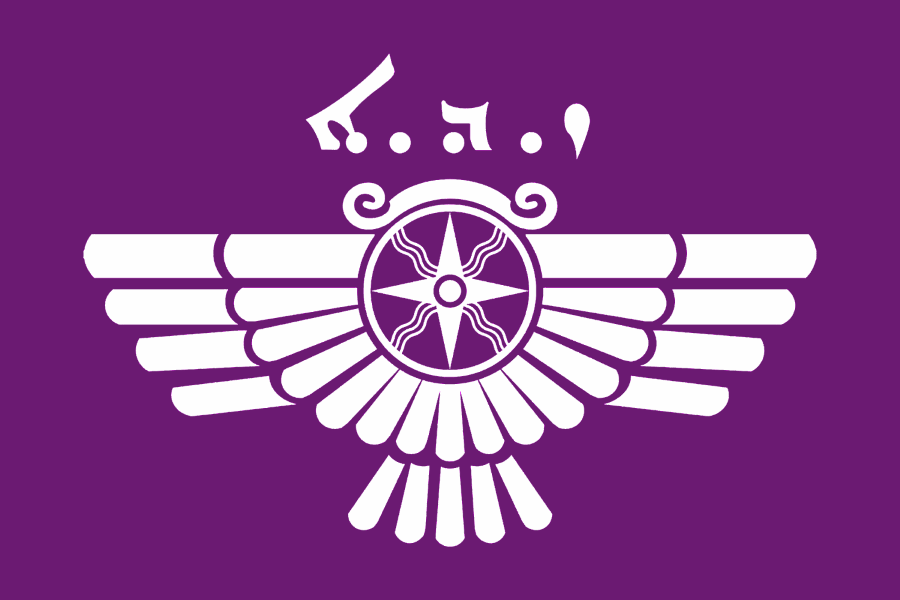|
Zowaa
The Assyrian Democratic Movement ( syr, ▄Ö▄ś▄ź▄É ▄Ģ▄Ø▄Ī▄ś▄®▄¬▄ø▄Ø▄É ▄É▄¼▄ś▄¬▄Ø▄É, Zaw╩╗├Ī Demoqraß╣Ł├Īy├Ī ╩╝├üß╣»ur├Īy├Ī, ar, ž¦┘䞣ž▒┘āž® ž¦┘äž»┘Ŗ┘ģ┘éž▒ž¦žĘ┘Ŗž® ž¦┘äžóž┤┘łž▒┘Ŗž®, ADM), popularly known as Zowaa (), is an Assyrian political party situated in Iraq, and one of the main Assyrian parties within the Iraqi parliament. The Assyrian Democratic Movement states its aims are to establish equal citizenship rights with the rest of the Iraqi people without discrimination on the basis of nationality, belief, religious affiliation, culture, language and other characteristics of the native Chaldo-Assyrian Syriac people of Iraq, to acknowledge the past massacres committed against them and to ensure they are never repeated again. With regards to separatism from Iraq, the Assyrian Democratic Movement maintains that it does not seek the division of Iraq in order to establish an Assyrian state and states in its manifesto:''The national axis in the approach of the Assyrian Democratic ... [...More Info...] [...Related Items...] OR: [Wikipedia] [Google] [Baidu] |
Zowaa Emblem
The Assyrian Democratic Movement ( syr, ▄Ö▄ś▄ź▄É ▄Ģ▄Ø▄Ī▄ś▄®▄¬▄ø▄Ø▄É ▄É▄¼▄ś▄¬▄Ø▄É, Zaw╩╗├Ī Demoqraß╣Ł├Īy├Ī ╩╝├üß╣»ur├Īy├Ī, ar, ž¦┘䞣ž▒┘āž® ž¦┘äž»┘Ŗ┘ģ┘éž▒ž¦žĘ┘Ŗž® ž¦┘äžóž┤┘łž▒┘Ŗž®, ADM), popularly known as Zowaa (), is an Iraqi-Assyrians, Assyrian political party situated in Iraq, and one of the main Assyrian parties within the Council of Representatives of Iraq, Iraqi parliament. The Assyrian Democratic Movement states its aims are to establish equal citizenship rights with the rest of the Iraqis, Iraqi people without discrimination on the basis of nationality, belief, religious affiliation, culture, language and other characteristics of the native Iraqi-Assyrians, Chaldo-Assyrian Syriac Iraqis, people of Iraq, to acknowledge the past massacres committed against them and to ensure they are never repeated again. With regards to Assyrian independence movement, separatism from Iraq, the Assyrian Democratic Movement maintains that it does not seek the division of Iraq in order to esta ... [...More Info...] [...Related Items...] OR: [Wikipedia] [Google] [Baidu] |
Nineveh Plain Protection Units
The Nineveh Plain Protection Units ( syc, ▄Ü▄Ģ▄Ø╠ł▄ś▄¼ ▄Ż▄¼▄¬▄É ▄Ģ▄½▄ø▄Ü▄É ▄Ģ▄ó▄Ø▄ó▄ś▄É ; ar, ┘łžŁž»ž¦ž¬ žŁ┘ģž¦┘Ŗž® ž│┘ć┘ä ┘å┘Ŗ┘å┘ł┘ē) or NPU is an Assyrian military organization that was formed in late 2014, largely but not exclusively by Assyrians in Iraq to defend themselves against Islamic State of Iraq and the Levant.John Burger for Aletia. December 4, 201Christians in Iraq Forming Militia to Defend, and Possibly Retake, Ancestral Lands/ref> The Nineveh Plains is a region where Assyrians in Iraq have traditionally been concentrated.Steven Nelson for ''U.S. News & World Report''. Feb. 6, 201Iraqi Assyrian Christians Form Anti-ISIS Militia, and You Can Legally Chip In/ref> Statistics By December 2014, the group said it had between 500 and 1,000 men in training, that the US was helping train them, and that financial support was coming mostly from Assyrians in the US and Europe. In February 2015 there were unverified reports that the group had 5,000 Assyrian men registered to ... [...More Info...] [...Related Items...] OR: [Wikipedia] [Google] [Baidu] |
Kirkuk
Kirkuk ( ar, ┘āž▒┘ā┘ł┘ā, ku, ┌®█Ģž▒┌®┘ł┘ł┌®, translit=Kerk├╗k, , tr, Kerk├╝k) is a city in Iraq, serving as the capital of the Kirkuk Governorate, located north of Baghdad. The city is home to a diverse population of Turkmens, Arabs, Kurds, and Assyrians. Kirkuk sits on the ruins of the original Kirkuk Citadel which sits near the Khasa River. Kirkuk was proclaimed the "capital of Iraqi culture" in 2010. It is claimed by the Kurdistan Regional Government as its capital. Kirkuk is also considered by Iraqi Turkmens to be their cultural and historical capital. The government of Iraq states that Kirkuk represents a small version of Iraq due to its diverse population, and that the city is a model for coexistence in the country. Etymology The ancient name of Kirkuk was the Hurrian ''Arrapha'' During the Parthian era, a ''Korkura/Corcura'' ( grc, ╬ÜŽīŽü╬║ŽģŽü╬▒) is mentioned by Ptolemy, which is believed to refer either to Kirkuk or to the site of Baba Gurgur from the city. Since ... [...More Info...] [...Related Items...] OR: [Wikipedia] [Google] [Baidu] |
Urmia
Urmia or Orumiyeh ( fa, ž¦ž▒┘ł┘ģ█ī┘ć, Variously transliterated as ''Oroumieh'', ''Oroumiyeh'', ''Or┼½m─½yeh'' and ''Ur┼½miyeh''.) is the largest city in West Azerbaijan Province of Iran and the capital of Urmia County. It is situated at an altitude of above sea level, and is located along the Shahar River on the Urmia Plain. Lake Urmia, one of the world's largest salt lakes, lies to the east of the city, and the mountainous Turkish border area lies to the west. Urmia is the 10th-most populous city in Iran. At the 2012 census, its population was 667,499, with 197,749 households. The majority of the city's residents are Azerbaijanis, with a large minority of Kurds, and a smaller number of Assyrians, and Armenians, as well as Persian-speakers who moved to the city mostly for employment. The city is the trading center for a fertile agricultural region where fruits (especially apples and grapes) and tobacco are grown. Even though the majority of the residents of Urmia are Musli ... [...More Info...] [...Related Items...] OR: [Wikipedia] [Google] [Baidu] |
Iraqi Governing Council
The Iraqi Governing Council (IGC) was the provisional government of Iraq from 13 July 2003 to 1 June 2004. It was established by and served under the United States-led Coalition Provisional Authority (CPA). The IGC consisted of various Iraqi political and tribal leaders who were appointed by the CPA to provide advice and leadership of the country until the June 2004 transfer of sovereignty to the Iraqi Interim Government (which was replaced in May 2005 by the Iraqi Transitional Government, which was then replaced the following year by the first permanent government). The Council consisted of 25 members. Its ethnic and religious breakdown included 13 Shias, five Sunnis, five Kurds (also Sunnis), one Turkmen and an Assyrian. Three of its members were women. In September 2003, the Iraqi Governing Council gained regional recognition from the Arab League, which agreed to seat its representative in Iraq's chair at its meetings. On 1 June 2004, the Council dissolved after choosing mem ... [...More Info...] [...Related Items...] OR: [Wikipedia] [Google] [Baidu] |
Zalmay Khalilzad
Zalmay Mamozy Khalilzad ( ps, ┌ü┘ä┘ģ█ī ž«┘ä█ī┘ä ž▓ž¦ž», prs, ž▓┘ä┘ģ█ī ž«┘ä█ī┘äŌĆīž▓ž¦ž»; born March 22, 1951) is an Afghan-American diplomat and foreign policy expert. Khalilzad was appointed by President Donald J. Trump to serve as U.S. Special Representative for Afghanistan Reconciliation in September 2018. President Joseph R. Biden asked Khalilzad to continue in this position after the 2020 presidential election. Khalilzad resigned as U.S. Special Representative for Afghanistan Reconciliation in October 2021. Khailzad was appointed by President George W. Bush to serve as United States Ambassador to the United Nations, serving in the role from 2007 to 2009. Khalilzad was the highest ranking Muslim-American in government at the time he left the position. Prior to this, Khalilzad served in the Bush administration as Ambassador to Afghanistan from 2004 to 2005 and Ambassador to Iraq from 2005 to 2007. Raised in the Afghan capital of Kabul, Khalilzad came to the United States ... [...More Info...] [...Related Items...] OR: [Wikipedia] [Google] [Baidu] |
George W
George Walker Bush (born July 6, 1946) is an American politician who served as the 43rd president of the United States from 2001 to 2009. A member of the Republican Party, Bush family, and son of the 41st president George H. W. Bush, he previously served as the 46th governor of Texas from 1995 to 2000. While in his twenties, Bush flew warplanes in the Texas Air National Guard. After graduating from Harvard Business School in 1975, he worked in the oil industry. In 1978, Bush unsuccessfully ran for the House of Representatives. He later co-owned the Texas Rangers of Major League Baseball before he was elected governor of Texas in 1994. As governor, Bush successfully sponsored legislation for tort reform, increased education funding, set higher standards for schools, and reformed the criminal justice system. He also helped make Texas the leading producer of wind powered electricity in the nation. In the 2000 presidential election, Bush defeated Democratic incum ... [...More Info...] [...Related Items...] OR: [Wikipedia] [Google] [Baidu] |
Henry Hyde
Henry John Hyde (April 18, 1924 ŌĆō November 29, 2007) was an American politician who served as a Republican member of the United States House of Representatives from 1975 to 2007, representing the 6th District of Illinois, an area of Chicago's northwestern suburbs. He was Chairman of the Judiciary Committee from 1995 to 2001, and the House International Relations Committee from 2001 to 2007. He is most famous for writing the Hyde Amendment, as a vocal opponent of abortion. Early life Hyde was born in Chicago, the son of Monica (Kelly) and Henry Clay Hyde. His father was English and his mother was Irish Catholic. His family supported the Democratic Party. Hyde graduated from St. George High School in 1942. He attended Duke University, where he joined the Sigma Chi Fraternity, graduated from Georgetown University and obtained his J.D. degree from Loyola University Chicago School of Law. Hyde played basketball for the Georgetown Hoyas where he helped take the team to the 1943 c ... [...More Info...] [...Related Items...] OR: [Wikipedia] [Google] [Baidu] |
Assyrians In The United States
Assyrian Americans ( syr, ▄Ż▄ś▄╝▄¢╠ł▄Ą▄Ø▄╣▄É ▄É▄▓▄Ī▄¬╠ł▄Ø▄╝▄¤▄Ą▄Ø▄╣▄É) refers to individuals of ethnic Assyrian ancestry born in or residing within the United States of America. Assyrians are an indigenous Middle-Eastern ethnic group native to Mesopotamia in West Asia who descend from their ancient counterparts, directly originating from the ancient indigenous Mesopotamians of Akkad and Sumer who first developed the independent civilisation in northern Mesopotamia that would become Assyria in 2600BCE. Modern Assyrians often culturally self-identify as Syriacs, Chaldeans, or Arameans for religious and tribal identification. The first significant wave of Assyrian immigration to the United States was due to the Sayfo genocide in the Assyrian homeland in 1914-1924. The largest Assyrian diaspora is located in Metro Detroit, with a figure of 150,000. High concentrations are also located in Phoenix, San Jose, Modesto, San Diego, Los Angeles, Turlock, and Chicago among others ... [...More Info...] [...Related Items...] OR: [Wikipedia] [Google] [Baidu] |
Simele
Simele or Semel ( ku, ž│█Ä┘ģ█Ä┘ä, translit=S├¬m├¬l, ar, ž│┘ģ┘Ŗ┘ä, Syriac: ▄Ż▄Ī▄Ā▄É) is a town located in the Dohuk province of Kurdistan Region in Iraq. The town is on the main road that connects Kurdistan Region to its neighbor Turkey. It is west of Dohuk. The town had a population of 71,557 in July 2018. Etymology The word "S├¬m├¬l" may originate from the Kurdish words "s├¬" and "mil" meaning "three hills", or "s├¬ mal" meaning "three homes". Information Simele was a small Kurdish village until the mid-1910s as the village was populated by Armenian and Assyrian refugees fleeing massacres during Sayfo and the Armenian genocide. During the Simele massacre in 1933, around three thousand Assyrians were massacred prompting many to flee the country as a consequence. The main Assyrian tribe in Simele at the time was Baz. In 2011, the population was mostly Kurdish with a small Assyrian minority of 635 people. Around half of the Assyrian minority adhere to the Assyrian Church o ... [...More Info...] [...Related Items...] OR: [Wikipedia] [Google] [Baidu] |
Abu Ghraib Prison
Abu Ghraib prison ( ar, ž│ž¼┘å žŻž©┘ł ž║ž▒┘Ŗž©, ''Sijn Ab┼½ Ghurayb'') was a prison complex in Abu Ghraib, Iraq, located west of Baghdad. Abu Ghraib prison was opened in the 1950s and served as a maximum-security prison with torture, weekly executions, and poor living conditions. From the 1970s, the prison was used by Saddam Hussein and later the United States to hold political prisoners. It developed a reputation for torture and extrajudicial killing, and was closed in 2014. Abu Ghraib gained international attention in 2003 following U.S. invasion of Iraq, when the torture and abuse of detainees committed by guards in part of the complex operated by Coalition forces was exposed. Israeli interrogators were in Iraq, alongside the Coalition, because they spoke Arabic. In 2006, the United States transferred complete control of Abu Ghraib to the federal government of Iraq, and was reopened in 2009 as Baghdad Central Prison (Arabic: ž│ž¼┘å ž©ž║ž»ž¦ž» ž¦┘ä┘ģž▒┘āž▓┘Ŗ ''Sijn Ba─Īd─üd ... [...More Info...] [...Related Items...] OR: [Wikipedia] [Google] [Baidu] |








